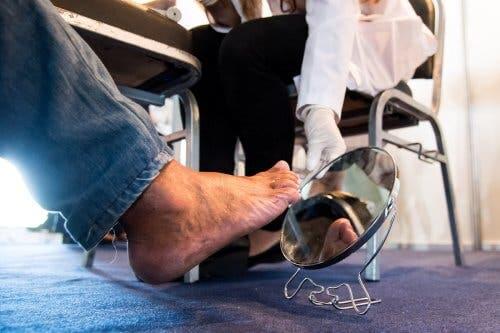Essential Oils for Neuropathy in Diabetic Patients

People have known about the therapeutic properties in essential oils for hundreds of years. They are recognized for their ability to improve physical and mental well-being, especially if you have certain conditions. Therefore, it’s not a surprise that you can use essential oils for neuropathy in diabetic patients.
This condition is serious, since it causes progressive nerve damage from high blood sugar levels. It can become asymptomatic, but usually it causes numbness, pain and other discomfort in the extremities. Also, in severe cases, it compromises digestive and cardiac health.
How can essential oils help? Although researchers need more evidence to confirm its effects, some studies suggest that essential oils for neuropathy can help minimize some of these symptoms in treatment. Let’s look at the details below.
What is diabetic neuropathy?

Before going into detail about how essential oils for neuropathy can help people in diabetes, it’s important to know some basics about neuropathy. As we have already mentioned, it’s a serious and common complication of both type 1 and 2 diabetes.
It happens due to long-term high blood sugar levels, especially when it’s not under control. As a result, nerves are damaged and the affected areas start to show pain, numbness and other symptoms that get worse.
Even when the condition is severe and prolonged, patients are vulnerable to injuries and infections that are hard to treat. Since it’s harder for the body to heal when the blood sugar isn’t under control, it can even lead to amputation.
Discover: How to Protect Yourself Against Coronavirus If You Have Diabetes
Types of diabetic neuropathy
The term neuropathy describes different types of nerve damage. For patients with diabetes, there are four main types of neuropathy:
- Peripheral neuropathy: This is the most common form. Mainly, it affects the feet and legs, but it can also involve the arms and hands.
- Autonomic neuropathy: This affects the autonomic nervous system. Therefore, it leads to digestion problems, heart diseases and sexual dysfunction.
- Mononeuropathy: Also called focal neuropathy, it happens when there’s damage to a specific nerve or group of nerves. Then, it causes weakness in the affected area. Also, it usually affects the hand, head, torso and legs.
- Proximal neuropathy: This is a rare form of neuropathy. Often, it affects the hips, buttocks and thighs, causing sudden pain and muscle weakness.
Causes of diabetic neuropathy

Diabetic patients are susceptible to neuropathy because of high blood sugar levels. The risk is higher when you don’t control it for a long period of time. Other factors that affect its development are:
- Damage to blood vessels due to high cholesterol levels
- Mechanical injuries, like carpal tunnel
- Bad habits, like smoking and drinking alcohol
- Vitamin B12 deficiency
Diabetic neuropathy symptoms
The symptoms of neuropathy vary from patient to patient. Most of the time, the first affected area is the feet. There, you might experience discomfort like pricks and pain. Other symptoms are:
- Sensitivity to touch
- Loss of sense of touch
- Coordination problems when walking
- Numbness or pain in the hands or feet
- Burning feet, especially at night
- Muscle weakness
- Swelling or bloating
- Nausea, indigestion or vomiting
- Diarrhea or constipation
- Dizziness and excessive sweating
- Bladder problems, like incontinence
- Vaginal dryness
- Erectile dysfunction
- Vision problems, such as double vision
- Increased heart rate
How do essential oils for neuropathy help people with diabetes?

Essential oils are used in natural medicine as allies to treat various symptoms and health problems. Its use, especially in aromatherapy, can help speed up the recovery period of certain conditions. They can also help relieve:
- Cuts, scratches and infections
- Hormonal imbalances
- States of stress, tension and anxiety
- Sleeping problems
In this particular case, essential oils for neuropathy can help diabetic patients. In fact, their benefits include pain relief and better digestion. How do they work?
Essential oils for neuropathy in diabetics
Peppermint, Roman chamomile and lavender essential oils can be beneficial in treating neuropathy in people with diabetes. Although more research is needed to assess their effects, risks and benefits, some people have found relief through this treatment.
- Mint: It has a slight analgesic effect that helps reduce pain. In addition, it acts as a muscle relaxant and helps with digestion problems.
- Roman chamomile: A study from 2014 showed that this plant may help treat inflammatory disorders. In fact, it can even combat oxidative stress.
- Lavender: Known for its relaxing and pain-relieving action, lavender is another essential oil to treat neuropathy in people with diabetes. Its properties improve the quality of sleep, relax the muscles and decrease pain.
You might like to read: The Incredible Benefits of Frankincense Essential Oil
How to use these oils
You can use these oils in several ways. Usually, you use them topically for pain relief, always diluted in a carrier like coconut or olive oil. That way, it prevents the essential oils from irritating your skin.
Another way to use them is to dilute a small amount in your bath water. This allows you to take advantage of their aromatic properties and, in turn, they absorb through your skin. Both solutions can minimize some of the symptoms associated with nerve damage.
Risks and warnings of essential oils for neuropathy in diabetic patients
The effectiveness of using essential oils to treat neuropathy in diabetics can vary. Since more evidence is required to verify its effectiveness, it probably won’t work the same in all patients. Also, it’s important to use 100% pure essential oils.
On the market, you’ll also find some low quality essential oils that don’t have the same benefits. Also, make sure you use quality carrier oils. To avoid allergic reactions, test the product on a small part of your skin.
If you notice any outbreaks, swelling or red spots, don’t keep using them. In addition, if you become pregnant, make sure to talk to your doctor before using them. Finally, don’t ingest essential oils for any reason.
All cited sources were thoroughly reviewed by our team to ensure their quality, reliability, currency, and validity. The bibliography of this article was considered reliable and of academic or scientific accuracy.
- Yagihashi, S., & Mizukami, H. (2017). Diabetic neuropathy. In Diabetes and Aging-related Complications. https://doi.org/10.1007/978-981-10-4376-5_3
- Callaghan, B. C., Cheng, H. T., Stables, C. L., Smith, A. L., & Feldman, E. L. (2012). Diabetic neuropathy: Clinical manifestations and current treatments. The Lancet Neurology. https://doi.org/10.1016/S1474-4422(12)70065-0
- Zhao, J., Khan, S. I., Wang, M., Vasquez, Y., Yang, M. H., Avula, B., … Khan, I. A. (2014). Octulosonic acid derivatives from Roman chamomile (Chamaemelum nobile) with activities against inflammation and metabolic disorder. Journal of Natural Products. https://doi.org/10.1021/np400780n
- Davies, S. J., Harding, L. M., & Baranowski, A. P. (2002). A novel treatment of postherpetic neuralgia using peppermint oil. Clinical Journal of Pain. https://doi.org/10.1097/00002508-200205000-00011
- Cavanagh, H. M. A., & Wilkinson, J. M. (2002). Biological activities of lavender essential oil. Phytotherapy Research. https://doi.org/10.1002/ptr.1103
- Hajhashemi, V., Ghannadi, A., & Sharif, B. (2003). Anti-inflammatory and analgesic properties of the leaf extracts and essential oil of Lavandula angustifolia Mill. Journal of Ethnopharmacology. https://doi.org/10.1016/S0378-8741(03)00234-4
This text is provided for informational purposes only and does not replace consultation with a professional. If in doubt, consult your specialist.








